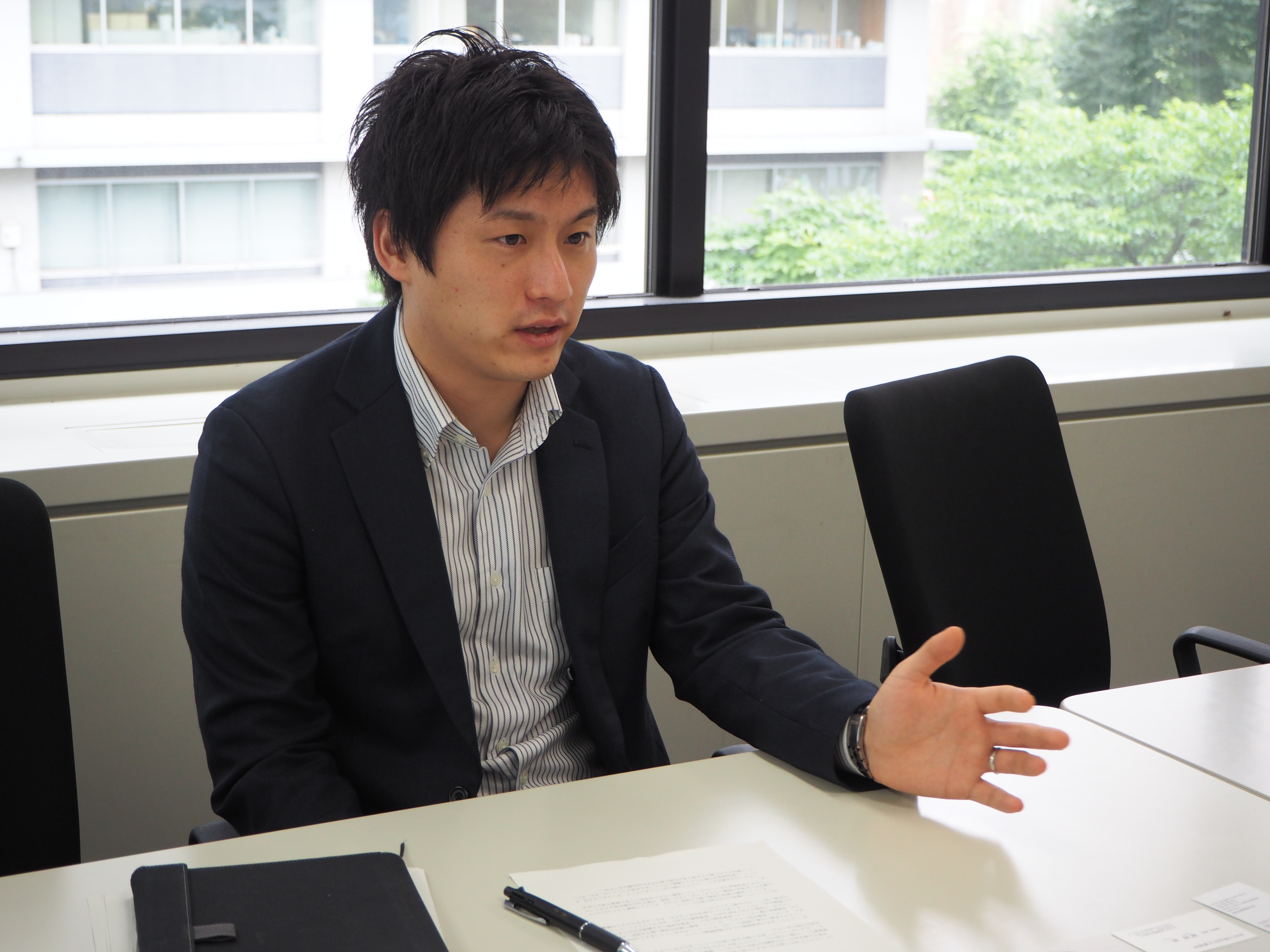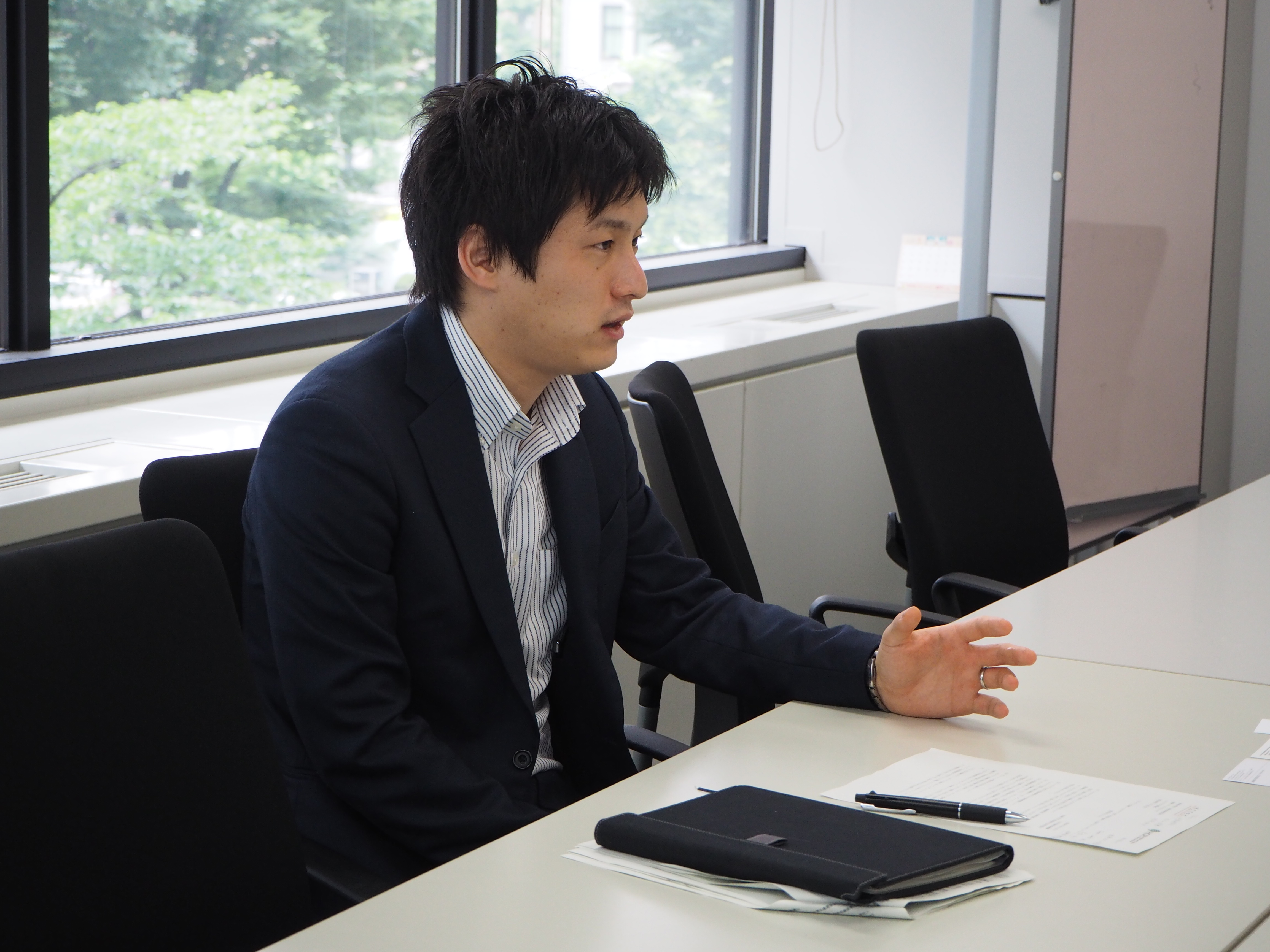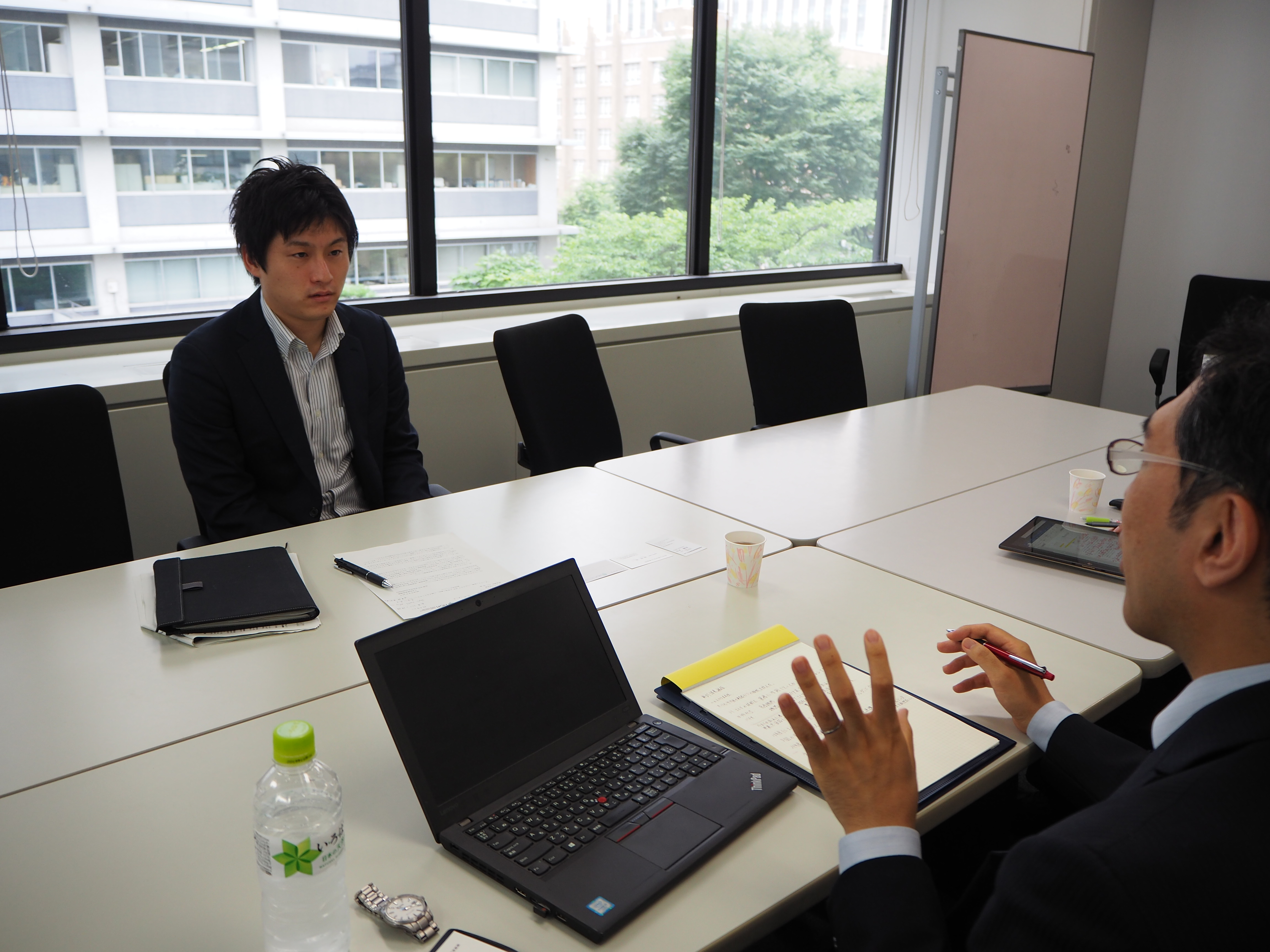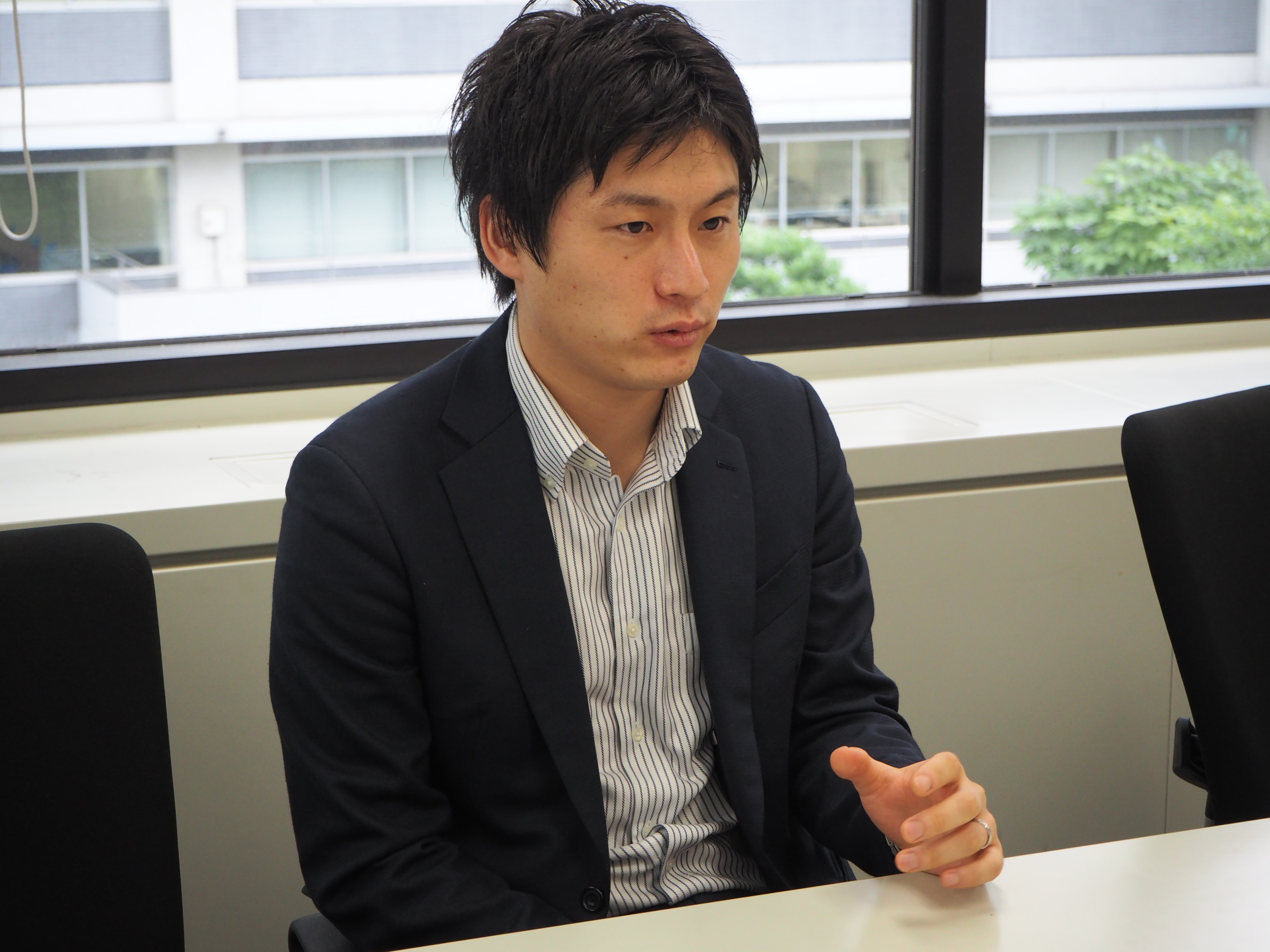© Health and Global Policy Institute
Healthcare ICT initiatives for industrial and health promotion, and its future visions
Keiichi Tamura
ーThank you for taking time out of your busy schedule to meet. Interest is growing in the use of Information and Communication Technology (ICT) in the healthcare field for responding to the issues of low birthrates and an ageing population. I believe the Ministry of Economy, Trade and Industry (METI) can provide multifaceted support in this field. Please tell us what initiatives have been already been undertaken in the use of ICT in healthcare.
Sho Irie
The ICT healthcare field is very broad. At METI, we focus on how ICTs can be safely applied in healthcare while determining the added value and possible innovations it could help to bring about in the field.
There have been innovations that have made medical equipment more sophisticated and the discovery process for new drugs more efficient. A concrete example is that the effectiveness of stents and advanced medical equipment such as MRIs and endoscopy equipment increased to the point they became more effective than practices currently in place, such as drug prescription and surgery. However, the use of ICTs is not limited to these applications.
As the rate of chronic diseases such as lifestyle-related diseases or dementia increases in Japan, doctors’ duties will no longer stop at examining patients, reading data from lab tests, and dispensing drugs and advice. Healthcare must now encompass daily lifestyle factors, meaning that the medical treatments of the past are no longer sufficient. Innovation now should not be a matter of merely developing ever more sophisticated medical equipment and drugs for use at healthcare facilities, but must result in changes to the care process. I believe ICT could enable this to happen. Up until now, we have not been able to innovate in a way as to change the healthcare process.

When I talk to doctors who treat diabetes, they report that the major hurdle to treatment is that they only know about patients’ daily lives through self-reporting. Such situations pose challenges to existing treatment processes, but the current thinking at METI is that advances in ICTs allow us to overcome those challenges. As part of this trend of advancement, METI started applying the Internet of Things (IoT) in 2016 to improve treatment outcomes for diabetes. Diabetes patients with mild symptoms are given wearable monitors and are asked to self-monitor. When data thus obtained is shared with experts such as doctors, nurses, and nutritionists, it allows them to intervene at the right time. For example, a healthcare provider could notify a patient when he or she is gaining weight. In practice, nutritionists intervene using chat applications or messages are sent automatically using algorithms. In 2016, we launched a project to verify the efficacy of such interventions when treating diabetes.
Based on the results of that project, a full-scale clinical research project was launched in 2017 by the Japan Agency for Medical Research and Development (AMED). The results of research from FY2017 were taken into account and a clinical trial with a larger scale and longer duration is now being conducted for three years. It involves about 2,000 patients with mild diabetes. At that scale and duration, we will be able to verify if there is an effect on treating diabetes.
With the use of these methods, we have tried to confirm whether initiatives using ICTs truly have merits for patients and doctors. As in other industries, the very introduction ICT is assumed to be a good thing. This climate presents a good opportunity to simply force the introduction of ICTs, but it in the field of healthcare where doctors provide care directly to patients; change must only be made gradually. It is important we proceed with firm evidence in hand.
Daisuke Sato
ーIt has long been established that advances in medical equipment, biotechnology, biological materials, and drugs are made through continuous improvements to past technologies. On the other hand, the effectiveness of ICT is still being verified. It seems promoting it requires a different approach.
Sho Irie
Yes, it does. Innovations that improve medical equipment and drug manufacturing must happen continuously. Many companies are already actively working towards that goal. On the other hand, introducing ICT would change the medical process itself. Also, we are not yet sure of the best way to use the data that would be generated by healthcare ICT after it is introduced. We are also still in the dark about what the data itself will be. In other words, because doctors have not been directly presented with evidence, we the government must work to provide strong support for establishing evidence. If the introduction of ICT proves effective, we will encourage the entry of various players into the market. We believe the most important thing is to create a service doctors can trust.
Keiichi Tamura
ーPilot projects have been running since 2016. What did those originate from, ICT or home-based lifestyle intervention?
Sho Irie
At that time, I had not yet taken up my current post, but I believe ICT was first. The entire world is experiencing various disruptive innovations caused by the fourth industrial revolution. Many such technologies and processes from very broad fields have already affected the healthcare field in this respect. Consequently, it will be difficult for the introduction of ICT to cause immediate and large changes in some parts of the medical field similar to changes we saw when ICT was introduced for shopping. But even in those unyielding sectors, the adoption of technologies has improved society and has brought us closer to “Society 5.0.” When we at METI think about what factors are necessary for the use of IoT and ICT in the medical field, we must think in terms of ways they benefit doctors and patients.
For example, doctors treating patients with diabetes have a hard time following up with patients between examinations. In other words, they cannot monitor the daily lives of their patients. Despite how hard doctors work to provide nutrition instructions to patients during examinations, sometimes patients’ conditions worsen between examinations because doctors cannot intervene during those times. Endocrinologists wish for an automatic or remote means of intervention. It is important to take the opinions of these doctors as hints for how to incorporate ICT, IoT, and other innovative products made available by the fourth industrial revolution in the field of healthcare. Within the ICT industry, it was METI who first thought to demonstrate the merits of such innovations to doctors.
Daisuke Sato
ーI think the approach of providing healthcare between examinations was not being taken anywhere. From various discussions I have heard, my understanding is that one of METI’s roles is to develop such an approach.
Sho Irie
In order to do that, we must use a different approach towards innovation than what has previously been followed by medical equipment makers. It is very important for startup ventures and existing major ICT businesses to get involved.
This, however, is still in the research phase. Therefore, except in the AMED project, we have yet to give much thought as to how to involve stakeholders from the private sector. In fact, we have been discussing ways to involve the people who will become users. Private sector stakeholders started being involved around January 2018, since the IT Healthcare Research Group was launched. Our objective is to establish evidence with the current pilot projects for diabetes and then nurture entrepreneurs in Japan who will enter the market and actively use their equipment and services.

© Health and Global Policy Institute
Compared to the U.S. and Europe, investments in ventures in Japan are small. They are 1% of the amount invested in the U.S. and approximately 7% of that of Europe and China. It is not surprising that there is less invested compared to the U.S and China, as we have issues that have to do with the Personal Information Protection Law. It cannot be helped. In Europe, however, laws protecting personal information are strict, and, irrespective of the fact that healthcare regulation in Europe is more similar to that of Japan than the U.S., there are great strides being taken in venture investment in Europe. If we do not properly nurture ICT healthcare in Japan, we will end up just importing services even after we finally introduce ICT in the healthcare field. We are afraid that would result in the adoption of services that do not reflect the needs of patients and doctors in Japan.
Against this background, Japanese industries have discussed ways to promote investment in the ICT healthcare field in an IT healthcare research seminar. The seminar involved not only members of the industry, but also members of the Japan Medical Association and people involved with healthcare such as medical researchers. This was to obtain a firm grasp on how medical service providers think.
One key phrase that came up during the seminar was “mutual understanding.” It is important to deepen mutual understanding between the business and healthcare sides in order to be able to develop ICTs that can be used in medical practice. From the perspective of medical practitioners, it is difficult to place trust in research and development proposals for healthcare ICTs from companies that had previously been developing games. On the other hand, businesses have pointed out that the medical industry, for no apparent reason, seems reluctant to share data. Because of this, there are many cases when things do not go well between the two sides, despite mutual efforts to meet halfway. In order to fill this gulf between them, businesses should clearly indicate to healthcare practitioners that they will use data for innovations in the healthcare field. On the other hand, they must recognize that there are various rules that medical practitioners such as doctors must follow. These rules include laws such as the Medical Practitioners Act, ethical guidelines, and international declarations such as the Helsinki Declaration. I believe that we at METI should support the process of bringing industry and healthcare service providers together.
Keiichi Tamura
ーAs you have said, not only venture companies, but all businesses are struggling with how to communicate their objectives for using data and their understanding of various rules for its use to healthcare service providers. We are also hearing from people that wonder where they should seek advice if they run into trouble while going through that process. Based on such circumstances, in your opinion, how quickly are the business and healthcare sides progressing towards mutual understanding?
Sho Irie
First, the challenges of promoting mutual understanding are not ones that can be solved simply by METI establishing some system for that purpose. It is a very tough issue that is extremely important to address.
We are currently thinking of collecting success stories to help with this issue. Success stories often get lots of attention when we promote policies that effect industry. One way METI tries to help create success stories is by building opportunities for doctors and businesses to collaborate. In fact, there are many other regulations concerning information management that doctors must follow besides what is in the Personal Information Protection Law. There are also ethical guidelines, such as those that govern medical research. Mutual understanding cannot be successfully built if businesses fail to understand these regulations. At METI, we are also investigating which regulations must be followed, and then communicating what those are to businesses so that they can observe them closely. We will demonstrate to doctors that those businesses can be trusted.
Even if businesses unilaterally observed regulations, healthcare service providers would still not be able to determine if such businesses are trustworthy. Therefore, businesses that properly observe guidelines must be recognized by a third party to raise their visibility. In order to bring this about, METI is deciding which guidelines must be followed, and will begin work on this issue in earnest in 2018.
Other issues discussed during the research seminar included how to organize ethical committee proceedings to enable the creation of success stories next year, and how to establish rights in joint research activities.
Daisuke Sato
―Rather than technologies such as electronic health records, the technologies currently gathering attention in the healthcare industry are ICT-related and enable more direct access to patients, such as with online consultation?
Sho Irie
Actually, I believe electronic health records fall under the umbrella of ICT. However, at METI, we are currently focused on services that enable direct access to patients and help make more people healthy rather than technologies that improve work efficiency, like electronic health records. Of course, as you adopt new technologies, it is natural that some parts of hospital IT systems must be changed to accommodate those new technologies. Therefore, while we introduce new technologies, we must also update existing IT systems at hospitals to accommodate new technologies.

© Health and Global Policy Institute
Daisuke Sato
―I believe that is why ICT is such an interesting topic within healthcare. When I interviewed Dr. Shinsuke Muto as part of this series of interviews, he mentioned that patient contact frequency increases when online consultation is available. Dr. Muto regarded online consultation as a platform than technologies used for treatment. He believes that increasing contact frequency will make treatments more effective. On the other hand, other people I talked to view information technology as a tool for directly approaching patients. When I hear both opinions, I cannot decide which one is right. I definitely believe that there is value in both. However, today’s conversation has convinced me that the decision to adopt those approaches should not depend on personal opinion.
Sho Irie
At METI, we also believe that online consultation should be the platform. We are rather closer to Dr. Muto in this sense. If we establish a platform for online consultation and are steadfast about promoting it, then we can make medical treatments more efficient. Since that would increase the frequency of medical examinations, it would lower the number of hospital visits – a situation I believe benefits both doctors and patients. In that sense, online consultation should be the platform when considering how to conduct monitoring to improve treatment efficiency.
The policy for building such a platform is extremely important, though the Ministry of Health, Labour and Welfare (MHLW) has already determined the direction for that, to an extent. For us at METI, it is a big plus that online consultation has been approved. Going forward, we will transition to the phase of considering how to make it more efficient and popular.
Keiichi Tamura
―The current revision of the medical fee reimbursement schedule has officially included reimbursement for online consultations. Since that will allow online consultation to become more common, opportunities for people working in healthcare to become acquainted with ICTs will increase tremendously. Do you think this will further accelerate the adoption of ICT?
Sho Irie
Healthcare providers were already using online consultation, but with the current revision of the medical fee reimbursement schedule, the system for online consultation is now being properly evaluated. Thanks to monitoring between successive medical examinations, this will enable us to use data that was previously unavailable. METI believes that the expansion of acceptable spaces to conduct medical examinations to include “In the home” is a very positive change in terms of developing infrastructure. If this results in a greater number of doctors trying to introduce online consultation, then they will definitely start using ICT. The original reason for introducing online consultation was that it benefits both patients and doctors. This is a point that METI should not forget. Online consultation is not good because it uses ICT or because it allows us to do new things. As we go about disseminating ICT, we must always ask ourselves if it is benefiting doctors. I believe the adoption of ICT healthcare systems including online consultation is fundamentally good for patients. However, we must always keep in mind that the purpose of providing medical services is to protect the lives of patients.
Keiichi Tamura
-Is METI’s support for policies in the healthcare field similar in nature to support it provides in other industries, or is the field of healthcare unique in that you aim to promote health and the economy at the same time?
Sho Irie
The nature of support is not necessarily the same for all industries. In industries other than healthcare, when companies see a certain path to profit, those that have the ability to make upfront investments actively move in that direction. On the other hand, the healthcare field is different in that the life of the patient must be protected. This means companies in healthcare cannot move as fast as companies in other industries. Work in the healthcare field can only be done while patient safety is maintained. We have to think about how to change things in the field while respecting that principle while at the same time not disturbing the work of a great number of doctors while they examine many patients. I do not think it will be easy.
The reason few new things arise in the healthcare field is because doctors are responsible for ensuring the safety of those new things. Because we can only proceed in healthcare while patient safety and comfort is ensured, the MHLW must put strict regulations into place. If novel innovations were unregulated and could be freely implemented, we run the risk of causing a great loss of life. That is why the MHLW has to assume responsibility and must play a particularly important role in this matter. In the healthcare field, it is very important the validation process for incorporating new services into practice be started only after patient consent has been clearly obtained and thorough measures to ensure safety have been taken. Because human lives are at stake, it is a unique characteristic of the healthcare field that such validation processes are difficult to conduct.
Keiichi Tamura
ーThrough this interview, I understood that METI’s basic policy is to strictly adhere to the goal of making people healthy, though that may be expressed differently from time to time. To be honest, I was surprised by how thoroughly METI thinks about the matter of ensuring people’s health.

© Health and Global Policy Institute
Sho Irie
It is a fact that social security systems must be sustainable if they are to lengthen healthy life expectancies and enable people to stay active their entire lives. However, the fact that industrial policy is also important for extending healthy life spans in addition to maintaining social security systems is gaining traction abroad. In particular, as countries in South-East Asia quickly progress into super-ageing societies, Japan’s knowledge in dealing with that matter could be gradually disseminated abroad. Consequently, we must first consider the particular purposes behind offering certain services. In other words, we must think what is necessary for enabling a service while not losing sight of the fact that our goal is to make people healthy. The question of how to raise capital is also important, but making people healthy should be clearly placed as the ultimate goal, and there are various approaches for achieving that goal.
Daisuke Sato
―I have the image that METI operates in a context strongly permeated by industrial development issues, and that development overseas is the responsibility of METI rather than MHLW. However, in matters of ICT healthcare, I think METI and MHLW share the same basic objective, which is to make people healthy. What do you think about this?
Sho Iries
I believe that business could not exist if that was not the objective. You could create a business with a goal of merely increasing people’s satisfaction, but that could not be called a “healthcare business.” The business of healthcare is about focusing on how to improve people’s health and extending their healthy lifespans.
Daisuke Sato
―From now, the focus will be on how information technology can contribute to people’s health, similar to what medical products and equipment already do.
Sho Irie
Yes, indeed.
Daisuke Sato
―Policies, and specifically, how to view them in terms of industrial promotion was the focus of this interview. I think what readers want to know about is the part not included in official documents from Ministries, and that is how various Ministries perceive matters. That is why I was very delighted to hear about METI’s way of thinking about its core policies on ICT healthcare today. Thank you very much.

